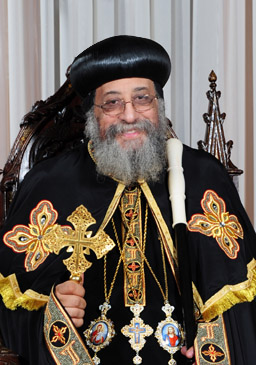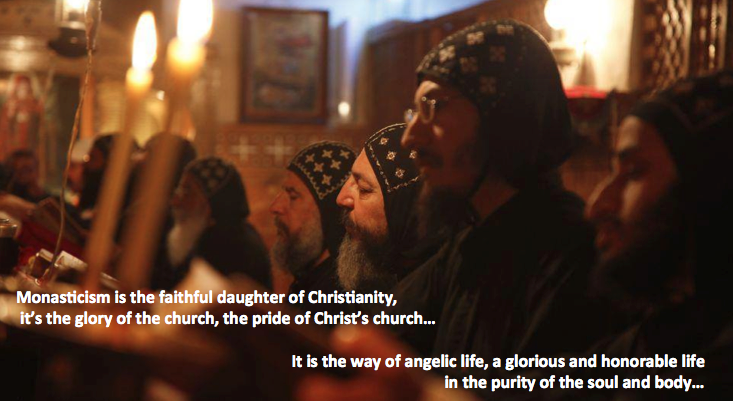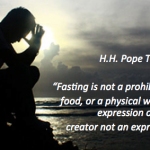My pious sons and daughters, Monks and nuns of our Coptic Orthodox monasteries on our land Egypt and the various continents of the world. The peace of the Lord that exceeds every mind may protect your hearts and thoughts in Christ Jesus. I am writing to you my annual monastic message for the second time, …
My pious sons and daughters, Monks and nuns of our Coptic Orthodox monasteries on our land Egypt and the various continents of the world. The peace of the Lord that exceeds every mind may protect your hearts and thoughts in Christ Jesus.
I am writing to you my annual monastic message for the second time, in the occasion of the remembrance of the departure of the great saint Abba Anthony, the father of all the monks and nuns. (30th January/ 22 Toba). And he was the one who chose his disciples and made them monks in this blessed life, and before him was Abba Paula who started the solitary life in the wilderness, and after him Abba Bakhomious organised the life of community in the monastery. In addition to the great fathers that established the monastic life, saint Abba Makarious, saint Abba Amonious, saint Abba Pesnatious and many others…
Monasticism is the faithful daughter of Christianity, it’s the glory of the church, the pride of Christ’s church, the advancement of the church and a symbol of its Christian message. It is the way of angelic life, a glorious and honourable life in the purity of the soul and body and unceasing spiritual prayer.
Monasteries are the spiritual communities dedicated to prayer and worship and serving people, and that’s our first and important goal. That’s what we taught and received from our spiritual fathers those whom we know face to face and lived with, or those whom we heard of through the books and learnt from their sayings and their life’s experiences. Let’s remember the basics of the monastic life and how that Godly love that works in the person’s life is what drew each one of us to this angelic way out of love and free choice in a certain time that God choses.
The monk or nun, is a person who longs for virtue and a witness to the world in many ways:
Obedience: the monk lives this life because he is in a spiritual battle exactly the same way as a soldier in a war because “everyone who competes for the prize is temperate in all things” (1 Cor 9:15). “Behold, to obey is better than to sacrifice” (1 Sam 15:22).
Chastity: the monk loves it even if it is hard, because it’s not impossible, and with God’s grace it becomes pleasant and easy to cope with. It’s a scale for the hearts (as in sheheet’s wilderness is the scale of the heart) that always rejoices and says “I can do all things through Christ who strengthens me.” (Philippians 4:13)
Poverty: the monk practices with internal satisfaction, because it’s obvious that “we brought nothing into this world, and it is certain we can carry nothing out. And having food and clothing, with these we shall be content. But those who desire to be rich fall into temptation and a snare, and into many foolish and harmful lusts which drown men in destruction and perdition. For the love of money is a root of all kinds of evil, for which some have strayed from the faith in their greediness, and pierced themselves through with many sorrows.” (1 Tim 6:7-10). And we recall with Saint Peter in truth “see we have left all and followed you.” (Mark 10:28) And about this said Isaac the syrian: “The monk is the person who stays outside the world and deeply pleads to God to receive blessings.” And human beings whatever rank they have, they can’t take the flower unless they scratch their fingers by the thorns, “we must through many tribulations to enter the kingdom of God.” (Acts 14:22)
My beloved sons and daughters, those whom I really love, you are my pleasure and crown, you are the guards of the church by your prayers and your praises to God. Your prayers are the strong support to my weakness and to all the church’s fathers and servants. You strive every day to get the precious jewel (Matt 13:46) and I mean the kingdom of heaven. You strive spiritually by being alert so that no one steals your crown. You stay away from every comfort or worldly leisure or sensual pleasure because you are striving for the spiritual richness and the pureness of the heart and the initial joy. This is by practicing the commandments of Christ from repentance, simplicity, humility, obedience and living and applying the monastic teachings that make you at the right hand of our Lord Jesus Christ on judgement day who invites you with all your brothers and sisters “come, you blessed of my father, inherit the kingdom prepared for you from the foundation of the world.” (Matt 25:34). And you can’t be a true monk unless you become like “an inflamed fire” as was said by the great desert fathers.
With the grace of God throughout the last year 2013 we had some important events that concerns monasticism; such as holding the first conference for the monks of the Coptic monasteries; establishing five new monasteries which were acknowledged by the holy synod, which are three for monks (St Anthony’s monastery in Austria, monastery of St Matthias elfakhoury in Luxor, St Mark and Anba Samuel monastery in South Africa), and two for the nuns (mother Sara’s monastery in El Menia, and the virgin’s monastery in malaoy).
We also appointed four bishops as abbots to the monasteries, (bishop Epiphanious for St Macarius monastery, bishop Ologios for the monastery of St Shenouda the Archimandrite in Sohag, bishop Selwanis for St Bakhomious monastery which is known as Elshayeb’s monastery in Luxor, and bishop Mishaeel for St Anthony’s monastery in Germany). And two abbesses for the nunneries (Tamav Takla for St George’s monastery-old Cairo, and Tamav Athnasia for the monastery of St George in Harat Zoeila) and by that those monasteries were stabilized into monastic life.
We also sent five monks in educational missions, (three of which are in Greece, and one in England and the other in Italy), and throughout the last year I have visited a couple of monasteries for both monks and nuns and I spent enjoyable time with them through praying and praising and teaching.
And that’s how the monastic life prospers both vertically and horizontally, and let your slogan that you repeat everyday be “I have been crucified with Christ; it is no longer I who live, but Christ lives in me.” (Galatians 2:20). Conserve your five senses so that you may enjoy the personal experiences with the person of our Lord, God and Saviour Jesus Christ.
May you be preserved in Christ enjoying your monastic life under the shade of the spiritual fathers. And may your life be steadfast in Christ and His holy church to Him the glory, honour and dominion now and forever and unto the ages of all ages, Amen.
Join Us: Sign Up Today!
Tags:












